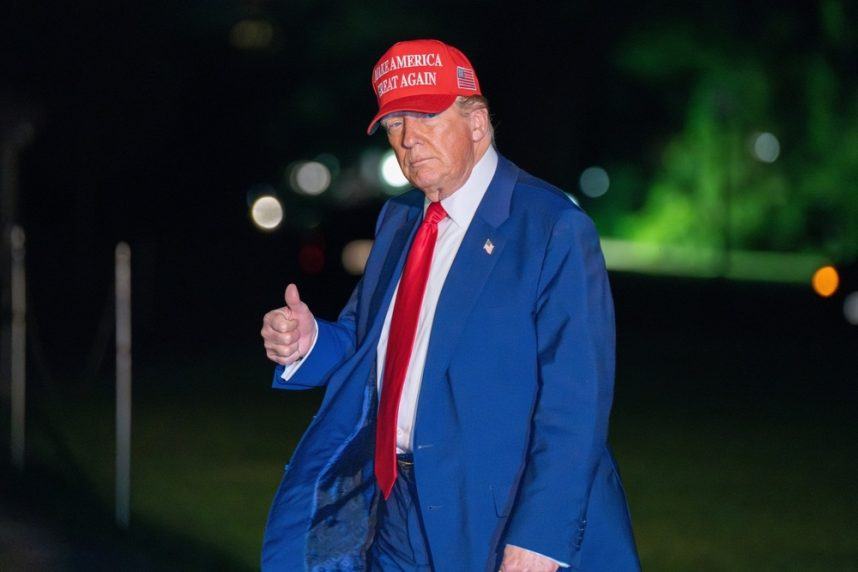Big Beautiful Bill Sports Betting Fears ‘Overblown,’ Says Analyst
Posted on: July 8, 2025, 02:09h.
Last updated on: July 8, 2025, 02:29h.
- Trump bill unlikely to be damaging to sportsbook operators, says analyst
- Some professional sports bettors likely to move offshore due to tax proposal
- Parimutuel, poker operators also likely to see minimal impact
President Trump’s One Big Beautiful Bill Act (OBBBA) contains a controversial amendment that would subject bettors to taxes on their losses, and while that provision has been derided in the wagering community, it has more implications for bettors than gaming companies.

In a new report to clients, Citizens equity research analyst Jordan Bender acknowledges that the One Big Beautiful Bill’s betting tax has “the potential to push players out of the legal market,” possibly weighing on total addressable market (TAM) in the process, but he adds fears of the legislation destroying the regulated sports betting industry are “overblown.”
His reasoning is simple: the universe of sports bettors that are actually making a living from that activity is sparsely populated and those that are considered “sharps” are likely already banned or severely limited by major sportsbook operators, such as DraftKings and FanDuel, implying there’s limited risk to operators by way of the big beautiful bill.
It is fairly well known at this point that legal sportsbooks limit wagering sizes or push away winning customers, whales, or sharps,” observes Bender. “This cohort of winning players is more likely to be betting offshore or with more traditional market-making books like Circa (private). VIPs, who can account for 25% to 50% of company revenue, are no different, as these sports betting companies are only catering to these players, knowing they are net losers in the long run, which would not be impacted by the incremental taxation.”
Bender adds that a proposed gaming tax could be damaging to professional bettors, potentially triggering “some level of migration” to offshore sportsbooks.
Big Beautiful Bill Limited Implications for Parimutuel, Poker
Bettors’ rebuke of the new tax scheme is justifiable because they’re the ones on the hook for increased financial liabilities, not gaming companies.
For example, professional poker players are likely to be among the most affected bettors if the big beautiful betting levy isn’t axed, but that’s of little concern to gaming companies because brick-and-mortar poker rooms and online poker represent a scant percentage of operator revenue.
“Poker is a game of volume for the operator, as revenue is generated from rake, or a fixed fee of each pot,” notes Bender. “Professional poker players could see the largest impact across the gaming spectrum from the tax change, but with poker revenue, including rake and buy-in fees, only representing ~1% of online gaming revenue in the United States, companies in our coverage universe have only a small exposure to poker as a percent of total revenue.”
When it comes to horse racing, that form of wagering runs a take-rate model similar to poker. Companies such as Churchill Downs (NASDAQ: CHDN) and FanDuel owner Flutter Entertainment (NYSE: FLUT) have parimutuel exposure, but the big beautiful bill isn’t a burden to them because both have international customer bases, and those bettors aren’t subject to US taxes, according to Bender.
Hope for Repeal of Big Beautiful Bill Betting Tax
It’s clear that bettors, not the industry, will bear the brunt of the altered waging tax, but there’s hope for repeal of the amendment. On Monday, Rep. Dina Titus (D-NV) and Rep. Ro Khanna (D-CA) introduced the Fair Accounting for Income Realized from Betting Earnings Taxation (FAIR Bet), which has already gained bipartisan support.
If passed, Titus’ bill would restore the provision allowing gamblers to deduct 100% of their losses against the winnings on which they’re paying taxes. That would be an obvious win for bettors, but the industry would benefit as well because if things return to the natural order, professional sports bettors could resist embracing alternatives such as prediction markets.
“Prediction markets are an inferior product to traditional sports betting; that said, avoiding taxable losses can now be added to the list of better pricing and cash-out for reasons that a sophisticated cohort (VIP, sharp, whales, professionals) could use the offering,” concludes Bender.
Last Comments ( 2 )
This bill has NOTHING to do with "Sharps" or "Professional" gamblers. Get your facts straight. Every American that gambles technically is effected by this bill. The dollar amounts are irrelevant. This ultimately means less money in gamblers pockets and less revenue to casinos or sportsbooks.
@etfgodfather. Do you not understand the bill and implications? ALL gamblers are effected by this, provided they file their taxes honestly and correctly. This ultimately means that casinos and sportsbooks are also effected. Winning or losing is irrelevant to the consequences from this bill. If you have ANY gambling wins in a tax year, they technically must be reported. Only now with this bill, one can only write off up to 90% of that number from losses, meaning they will owe on that 10% number regardless of their skill level or total win or loss.